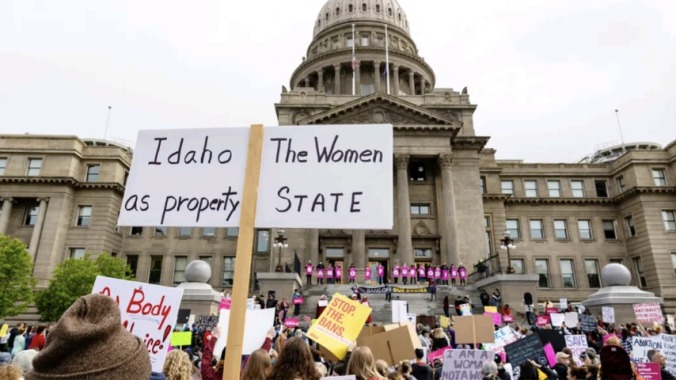Attorney for Idaho Says Women Endangered by Abortion Ban Are ‘Relying on Hypotheticals’
Jim Craig, who’s defending Idaho’s near-total abortion ban, made a series of dismissive and dehumanizing arguments against the plaintiffs in court on Tuesday.
Photo: Getty Images Abortion
On Tuesday, an Idaho state court began hearing arguments for Adkins v. State of Idaho, a lawsuit filed by Idaho women and OBGYNs who are challenging the dangerous ambiguity in the state abortion ban’s emergency exception. Four of the plaintiffs—Jennifer Adkins, Jillaine St.Michel, Kayla Smith, and Rebecca Vincen-Brown—experienced extreme, health-endangering pregnancy complications or nonviable pregnancies, but were denied emergency abortion care. They’re represented by the Center for Reproductive Rights.
Idaho enforces a total abortion ban that threatens doctors with five years in prison and only offers a narrow exception to save a pregnant person’s life. But as we’ve seen time and again, these exceptions are too ambiguous to be effective in practice, causing life-threatening delays or denying someone emergency abortion care altogether as doctors weigh the risk of jail time and heavy fines. The plaintiffs in this case were forced to travel out-of-state for care. While on the stand on Tuesday, Adkins called herself a “medical refugee”; she said her Idaho doctor could only provide a paper with a list of out-of-state abortion providers, handed over facedown, and a list of bereavement resources.
But before Adkins testified, during opening arguments on behalf of the state, Jim Craig, an attorney defending Idaho’s abortion ban, made a series of dismissive and dehumanizing arguments against the plaintiffs. Despite their suffering under the state’s laws, Craig accused the women of “relying on hypotheticals” for their lawsuit, citing how they aren’t currently pregnant. “Essentially, they’re saying, ‘Judge, we don’t like the language that’s in the law, so just rewrite the law. Give us something that we like better,'” Craig said. He denied that the women have evidence that the state’s abortion ban endangers pregnant patients’ lives, and cruelly argued that “they’re relying on hypotheticals and speculation as to what might happen to other people.”
-

-

-

-

-

-

-

-

-

-

-

-

-

-

-

-

-

-

-

-

-

-

-

-

-

-

-

-

-

-

-

-

-

-

-

-

-

-

-

-








































